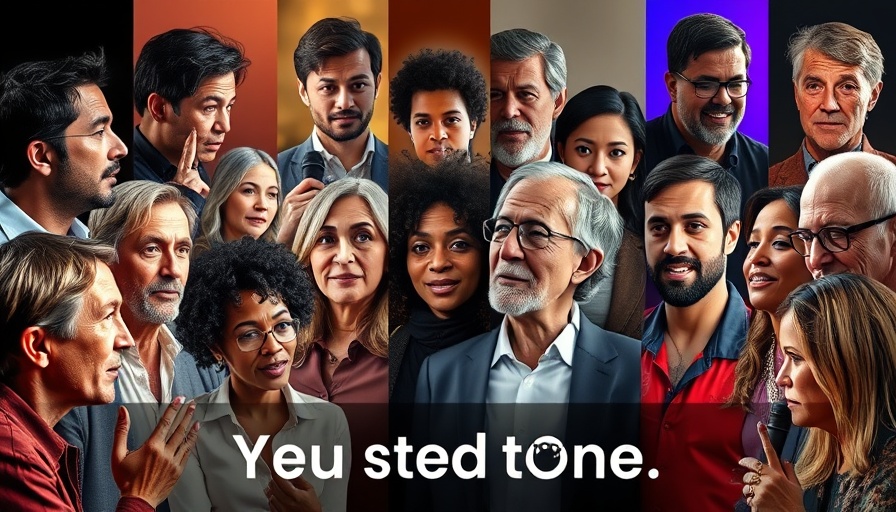
Understanding Modern Identity: A Shift from Behavior to Inner Feelings
The conversation surrounding identity has transformed dramatically over the centuries, reflecting a societal shift in how we understand ourselves. Historically, sex and identity were closely tied to behavior, but for many today, sexual orientation deeply shapes personal identity. This insight is critical for individuals, particularly those in leadership roles within the church, as they navigate conversations with younger generations who often view their identities through sexual lenses.
In 'How Did We Get So Self-Obsessed?', the discussion dives into identity and selfhood, exploring key insights that sparked deeper analysis on our end.
The Ideological Evolution of Selfhood
In the podcast “How Did We Get So Self-Obsessed?” featuring Carl Trueman, a rich discussion emerges regarding the evolution of ideological thought over the past 500 years, particularly related to modern identity and selfhood. Trueman argues that a significant turning point occurred in the 18th century with thinkers like Rousseau, who emphasized the importance of inner feelings as the defining characteristic of identity. This marked a departure from the previous understanding of selfhood, which was more communal and outwardly focused.
As Trueman notes, the idea that "who I am is increasingly determined by who I feel myself to be" encapsulates the modern struggle for identity. The implications of prioritizing personal feelings over societal norms have influenced various aspects of culture, including sexual politics, whereby sexual identity plays a foundational role in self-perception.
The Rise of Individualism and Its Cultural Impact
The emergence of individualism, which Trueman traces back to philosophers like Rousseau, granted a new authority to inner feelings, aiding the development of a modern self-concept. Individuals began to assert their sexual desires as pivotal to their identities—transforming how society engages with sexual ethics. This has led to complex discussions about morality and personal identity in church communities, pushing leaders to rethink how they address these issues pastorally.
Traditional views are now challenged by a generation that perceives identity as an internal, often sexualized narrative. The younger population looks toward personal authenticity and unfettered expression, often resulting in conflicting values between contemporary culture and traditional Christian teachings.
Hospitality and Embodiment: Counteracting Cultural Trends
Trueman emphasizes that while the individualistic focus may have its drawbacks, recognizing the value of personal feelings is essential. However, it prompts unavoidable risks, particularly when examining the impact of technology and cultural shifts on the church’s role. He suggests that Christian communities should counteract these trends through embodiment and hospitality. Engaging deeply with others and nurturing genuine relationships can reinstate a sense of belonging and purpose that technology often disrupts.
In practice, this means that church leaders must strive to create environments where individuals can explore their identities within the framework of community and shared beliefs, rather than isolated self-expression. By focusing on hospitality—whether it is through shared meals or communal activities—churches can foster an atmosphere that values the body and its experiences, directly contrasting the increasingly digital and disembodied nature of relationships today.
Pastoral Responses to the Modern Self
In shaping an understanding of human identity, a crucial takeaway from this discussion is the need for pastoral leaders to shift their approach from handling symptoms—like problematic behaviors associated with sexual identity—to addressing the underlying issues of anthropology and the essence of being human.
Trueman suggests that addressing these deeper concepts offers a more constructive pathway, allowing leaders to outline a positive vision of fulfillment and community that resonates with their congregation's lived experiences. Youth today are searching for personal connection; thus, the church must endeavor to provide a space where people feel seen, heard, and understood.
Embracing a Christian Anthropology
Ultimately, this process encompasses reestablishing a narrative around original sin and human fallibility. Discussions that tie intricate theological and biblical understandings to cultural realities can help foster a more comprehensive perspective on identity among believers and seekers alike. By embracing these conversations, churches can help individuals reconcile their identities with a rich, biblically based understanding of humanity.
Call to Action: Rethink Identity in Community
As we reflect on the complexities of identity in our modern context, it invites the church to engage in deeper discussions that bridge faith and self-understanding. Whether you are a believer, skeptic, or simply seeking answers, consider the role community and church can play in your journey toward understanding your identity more fully. Let's foster conversations that celebrate our shared humanity while challenging us to reflect on how our personal narratives align with a deeper understanding of God.
 Add Row
Add Row  Add
Add 








Write A Comment